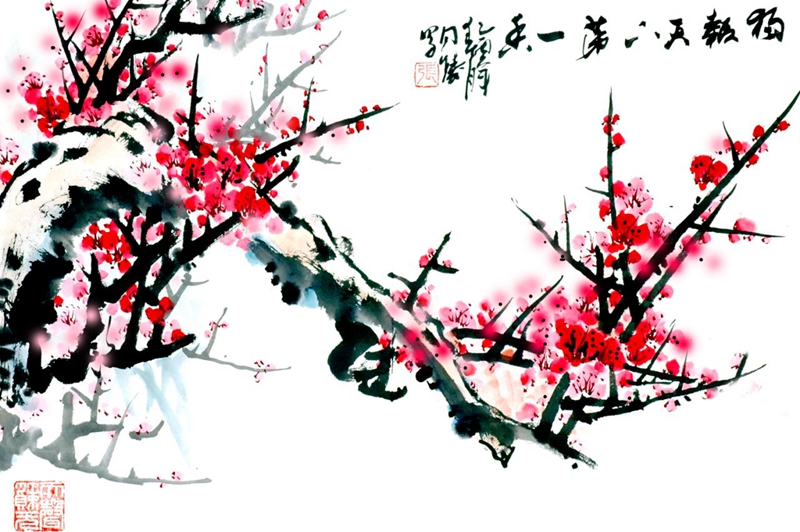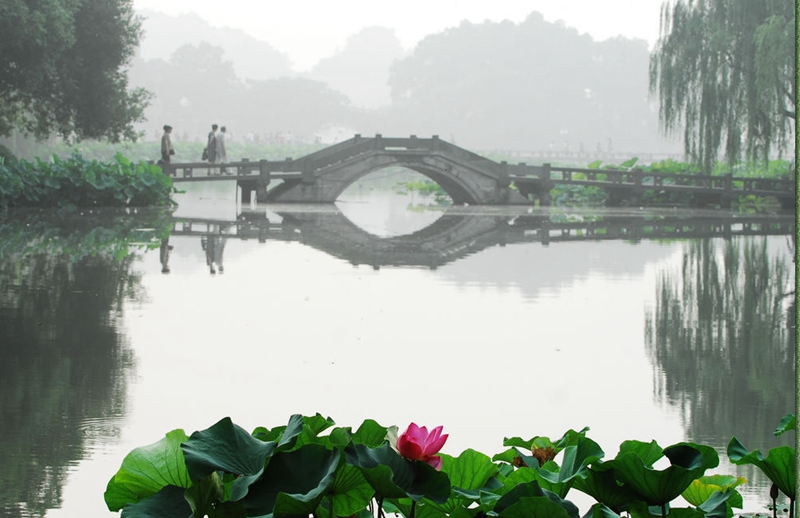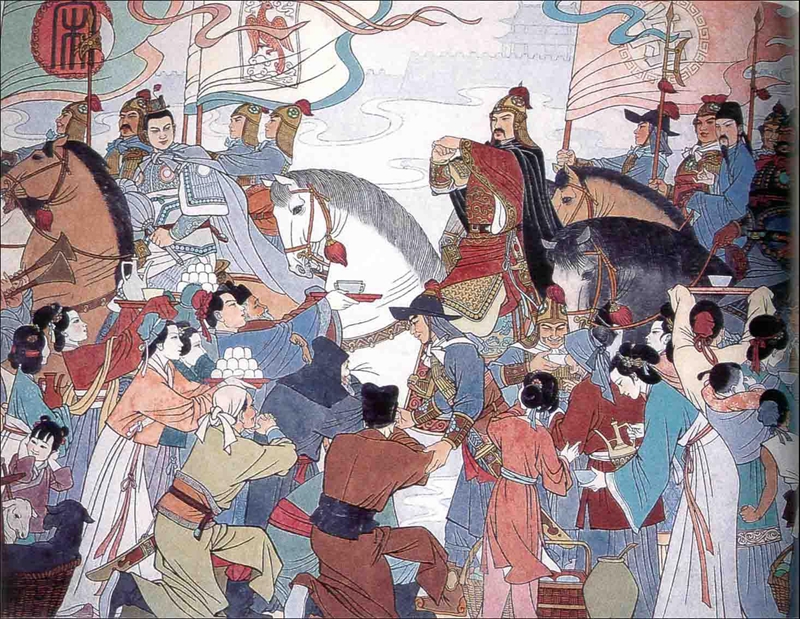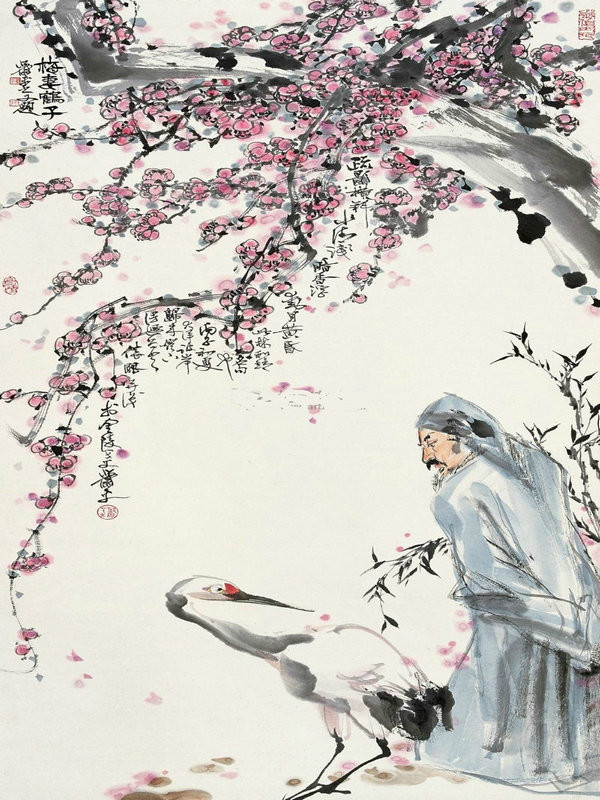|
Little Plum Blossom of Hill Garden (山园小梅) By Lin Bu (林逋) (Song Dynasty, 960–1279)
When everything has faded they alone shine forth
众芳摇落独暄妍,
encroaching on the charms of smaller gardens.
占尽风情向小园。
Their scattered shadows fall lightly on clear water,
疏影横斜水清浅,
their subtle scent pervades the moonlit dusk.
暗香浮动月黄昏。
Snowbirds look again before they land,
霜禽欲下先偷眼,
butterflies would faint if they but knew.
粉蝶如知合断魂。
Thankfully I can flirt in whispered verse,
幸有微吟可相狎,
I don’t need a sounding board or wine cup.
不须檀板与金尊。

Lin Bu (961-1028) was a most gifted Hangzhou poet. By keeping plum blossoms and cranes as his closest companions, he lived a serene life and remained unmarried all his life. The plum blossom symbolizes nobility, elegance and unbending will, which is in synergy with traditional Chinese philosophy and morality. During the harsh winter, when other plants wither, the noble plum blossom will burst out its flowers and fill the air with a pleasant fragrance. Due to its beautiful appearance and elegant spirit, the plum blossom is one of the favorite subjects for painters and poets. This poem is one of the classic poems devoted to this revered flower. To enhance the spirit and glamour of the plum blossom, Lin Bu, the most creatively gifted poet, set his poem with an atmospheric background, near the rippled water and bathed within moonlight. He also dramatized the respect it evokes by using the emotive reaction of the snowbirds and butterflies. The line: “Their scattered shadows fall lightly on clear water, their subtle scent pervades the moonlit dusk.”
Drinking by West Lake, Clear Sky at First, then Rain (饮湖上初晴后雨) By Su Dongpo(1037-1101)
The shimmering ripples delight the eye on sunny days.
水光潋滟晴方好,
The dim hills present a rare view in rainy haze.
山色空蒙雨亦奇。
West Lake compares to Xi Zi the beauty at her best.
欲把西湖比西子,
She is gorgeous richly clothed or plainly dressed.
淡妆浓抹总相宜。

The spirit and beauty of West Lake is immortalized by this classic, which is considered the best among all poems praising this lake. Because of this enchanting metaphor, West Lake is also named Xi Zi Lake, a romantic name that evokes feelings of beauty Xi Zi, a sort of Chinese Helen of Troy.
The River All Red (满江红) By Yue Fei (1037-1101)
Bristling with anger against the pillar
怒发冲冠
I look forward.
凭栏处
A pattering rain just over.
潇潇雨歇
As I raise my eyes,
抬望眼
And roar to the skies
仰天长啸
My ambitions are soaring high.
壮怀激烈
My contributions of the past thirty years
三十功名尘与土
Are as trivial as dust;
八千里路云和月
The responsibilities of my future years
三十功名尘与土
Will be as heavy as their weight.
八千里路云和月
Don’t wait idle in your young days,
莫等闲
Tears flow in vain when your head turns gray.
白了少年头, 空悲切!
Driving my chariot on expeditions
靖康耻,犹未雪;
I’ll quaff the invasion
臣子恨,何时灭?驾长车,踏破贺兰山缺。壮志饥餐胡虏肉,笑谈渴饮匈奴血。
Let me win back our lost hills and rivers
待从头,收拾旧山河,
Then face my emperor.
朝天阙!

This poem was written by Yue Fei (1103-1142), a much-revered military general living in the time of the Southern Song Dynasty. During his lifetime, he waged hundreds of wars and battles. His courage and outstanding military skills brought him respect from everyone except for one: Emperor Gaozong of Song (1107--1187). Gaozong was so threatened by Yue Fei’s mounting popularity that he fabricated a charge and put him into prison. In no time at all, the Southern Song Dynasty with Hangzhou as its capital, soon fell prey to the marauding Mongolian troops from the North. Suffering within the prison walls, he wrote this poem. Read between the lines and I’m sure you will feel the passion, anxiety and ambition of this patriotic hero.
A poem devoted to West Lake’s Spring (春题湖上) By Bai Juyi (772 - 846)
Now spring is here the lake seems a painted picture,
湖上春来似画图,
Unruly peaks all round the edge, the water spread out flat.
乱峰围绕水平铺。
Pines in ranks on the face of the hills, a thousand layers of green:
松排山面千重翠,
The moon centered on the heart of the waves, just one pearl.
月点波心一颗珠。
Thread ends of an emerald-green rug, the extruding paddy-shoots:
碧毯线头抽早稻,
Sash of a blue damask skirt, the expanse of new reeds.
青罗裙带展新蒲。
If I cannot bring myself yet to put Hangzhou behind me,
未能抛得杭州去,
Half of what holds me here is on this lake.
一半勾留是此湖。

Bai Juyi was a poet living in the Tang Dynasty (618-907). During his short 2 years stay in Hangzhou (822-824), he became entranced by West Lake’s beauty. To escape political schemes which were designed to entrap him, he quickly departed for Luoyang, Henan province. Prior to his departure, he expressed the pleasant feelings this lake had triggered as well as the reluctance to leave. The haunting beauty of West Lake in spring finds its fullest expression in this poem. Stirred by the poetic expressions of intoxicating moon, rolling hills cast reflections on jade-like water and thriving reeds fringed by emerald rice paddies, readers will be uplifted into an ancient utopian land.
(责任编辑:editor) |
